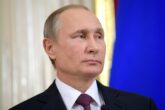July 18, 2018
Standing Up for Democracy
American Values and Great Power Competition
In its 2018 National Defense Strategy, released in January, the administration of U.S. President Donald Trump correctly identified great-power competition as the United States’ central security challenge. In recent years, rival states such as China and Russia have increased their ability to project power and undermine the U.S.-led liberal international order, even as Washington has struggled to respond. Beijing and Moscow, moreover, share a vision of a global order more conducive to their own forms of authoritarian governance. As a result, today’s great-power competition is a contest not just of nations but of political systems.
Thus far, the Trump administration has largely focused on great-power rivalry in terms of economic and military might. Its strategy documents have outlined the loss of the United States’ competitive military edge as other states have made major investments in new power projection technologies. Washington has used tariffs and other penalties in order to fight China’s mercantilist economic practices, while Congress and the administration have imposed sanctions on individual Russians accused of international transgressions.
These responses, however, are not enough. To overcome its geopolitical rivals, the United States must go beyond building a stronger military or enforcing economic rules; it must double down on its support for democracy around the world. Authoritarian powers such as China and Russia are working to subvert democracy where it exists, snuff it out where it is new, and keep it away where it is lacking. They see their assault on democracy as a matter not of values but of strategic advantage, whereby they can enhance their own power by eroding the internal cohesion of democracies and the solidarity of democratic alliances. Beijing and Moscow are on the offensive; meanwhile, Washington is hardly playing defense, much less doing what it needs to: championing a robust agenda for protecting and enlarging the free world.
Read the Full Article at Foreign Affairs
More from CNAS
-
Germany's New Defense Agenda
On April 9th, Friedrich Merz, the leader of Germany’s center-right Christian Democratic Union, secured a coalition agreement with the Social Democrats following his party’s vi...
By Andrea Kendall-Taylor & Jim Townsend
-
Trump ‘Humiliated’ as Putin Sends Clear Message That He Doesn’t Care About US
"Putin is not playing ball." Putin's Palm Sunday attack on Sumy is "embarrassing for the White House" as it comes just days after Steve Witkoff met with the Kremlin, says adju...
By Jim Townsend
-
The Hidden Past and Uncertain Future of the U.S. and Ukraine with Celeste Wallander
Under the Trump administration, U.S. support for Ukraine is no longer guaranteed. President Trump's pause on aid and intelligence to Ukraine in March may have been brief, but ...
By Andrea Kendall-Taylor, Jim Townsend & Celeste Wallander
-
Is Russia Under Pressure?
Since 2014, the United States and its allies have provided increasing military support to Ukraine while imposing more and tougher economic sanctions on Russia, especially sinc...
By Jeffrey Edmonds



